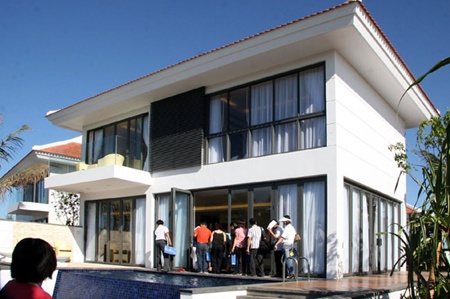Hanoi - Viet Nam should provide conditions for the proper development of real estate and finance such as Real Estate Investment Trust (REIT) along with real estate business projects.
 |
|
Customers visit a villa built by VinaCapital Real Estate Ltd in Da Nang's Ngu Hanh Son District. As of December 31, 2013, real estate loans amounted to around US$12.5 billion, accounting for 8 per cent of the country's total outstanding debt. - VNA/VNS Photo Van Son |
"Real estate finance is still underdeveloped and not yet diversified. Lenders should develop proper risk assessment methods and real estate finance products to govern the risk associated with properties and the market," said Can Van Luc, Deputy General Director of the Bank for Investment and Development of Viet Nam (BIDV).
Luc told a seminar on "Managing the real estate market and the role of financial institutions: Japan's experience and policy implications for Viet Nam" held in Ha Noi yesterday that financial institutions have been playing the important role of providing financial resources to the market, even under adverse market conditions, especially from soaring non-performing loans (NPLs) and the declining credit growth rate.
"In Viet Nam, banks provide major capital resources while other financial institutions including investment funds, pension funds and insurance companies provide rather limited funding," he added.
As of December 31, 2013,real estate loans amounted to around VND262 trillion (US$12.5 billion), accounting for 8 per cent of the total outstanding loans, while the budget spending for basic construction stood at VND77 trillion ($3.67 billion).
More than 65 per cent of the collateral was real estate though the bank's property loans have not been significant.
In addition, the spill-over effect of the market has been large and related to many economic sectors including construction, material manufacturing, design consultancy, labour and households, despite the fact that its market value accounted for just 5.4 per cent of the country's GDP last year.
"With all of these features, an effective and sound management toward the market is critical for Viet Nam's economy," he added.
Nguyen Manh Ha, director of the Construction Ministry's House Management Department said, though the property market was established in the early 1990s, some remarkable achievements have been recognised. Products have become more diversified especially in the housing segment while prices and transactions have been conducted on a market-oriented basis.
Ha said the sector has attracted a huge amount of FDI. Statistics from the Ministry of Planning and Investment showed that there have been 407 projects with about $49 billion registered capital in the market so far, accounting for 21 per cent of the total.
"However, the market has faced numerous shortages and has also witnessed periods of too hot or freezing statuses," he said, adding that property investment lacked planning, transparency and professionalism.
Real estate prices were much higher than people's average incomes.
That was the reason why, until 2013, there was surplus supply in most of the market segments that caused prices to fall with many socio-economic consequences.
Sharing the experiences of analysing factors that have led to the real estate bubble economy, its crash and the prolonged economic crisis in Japan from a macro aspect and a micro aspect at financial institutions, Hara Takashi, a specialist at the Japan International Co-operation Agency (JICA) recommended that Viet Nam be imparted certain lessons to resolve the situation.
He said, what Viet Nam should understand about market features is that a bubble economy would not last for long and would definitely burst.
"Excessive optimism should be avoided and never believe that the market will continuously rise so that borrowers can keep borrowing in the hope of rising profits. Lenders should, therefore, not believe that prices keep rising and must avoid over-pricing the real estate collateral," he said.
At financial institutions it did not seem so easy to identify and take prompt action regarding the real estate bubble from a "bottom-to-top" approach, he added.
The country should improve its credit monitoring mechanism. Experiences showed that a low standard on NPL and lack of transparency were among the factors that led to ineffective monitoring.
Experts also suggested that Viet Nam should establish an independent centre for assets including property pricing and a centre for real estate market information and forecasts.
In addition, it should also improve the business environment and reduce administrative procedures as well as expand the room for foreign investors in the property sector.
The event was jointly held by BIDV and Japan's Sumitomo Mitsui Trust Bank (Sumi Trust) with an aim to share solutions and upcoming policy orientations. It also discussed Japan's experience in tackling the impact of a bubble economy on the real estate sector.